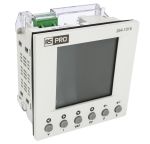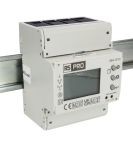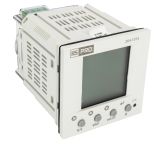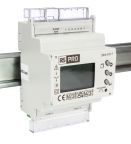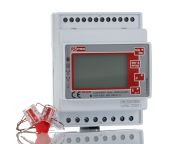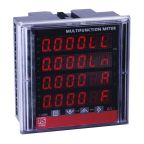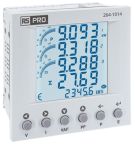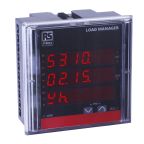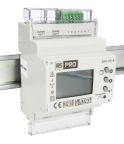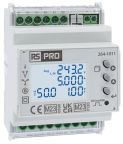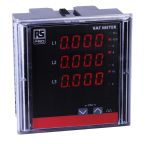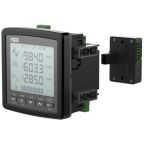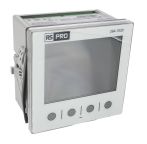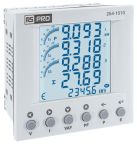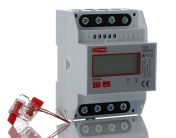Energy Meters
Energy meters are devices that measure the amount of electric energy consumed by a residence, business, or industrial facility. They provide valuable data for monitoring energy usage, identifying areas for improvement, and reducing energy costs.
What Are Energy Meters?
Businesses often face high electricity bills, so ensuring you have the right energy meter is essential. Energy meters, also known as power meters, electrical meters, or energy monitors, are devices used to help businesses check their electricity consumption without hassle.
Electric energy meters can record various electrical parameters, such as power consumption, frequency, voltage, current, and wattage. These meters come in different forms, including panel-mounted, DIN rail-mounted (suitable for equipment rack mounting), and plug-in models that connect directly to a wall outlet.
Integrating an energy meter into a power management system is ideal for monitoring energy usage. Energy meters typically feature digital LCD displays or analogue dials to show meter readings.
Energy Monitors
In the past, calculating electricity consumption in the home required owners to understand units, read meters, and estimate bills. Now, by taking advantage of an energy monitor as an electricity meter checker, you can see exactly how much energy you are consuming in real-time, down to how much it costs to run your washer or dryer.
While an energy monitor is sometimes used interchangeably with "energy meter," there is a subtle difference. An energy meter primarily measures the total electricity consumption for billing purposes, while an energy monitor provides more detailed, real-time data about individual appliances or circuits. For example, an energy monitor can show the cost of running your air conditioner for an hour or the daily energy use of your TV.
This information helps you identify energy-hungry appliances and track consumption patterns. With rising energy costs and growing environmental concerns, energy monitors are becoming essential tools for managing and reducing electricity consumption.
Types of Electrical Power Meters
Before we delve into the types of meters, let's briefly review how the two primary categories – digital and analogue power meters – function:
- Analogue Power Meters: These traditional meters utilise a rotating disc whose speed is proportional to the amount of electricity consumed. The disc's rotations are recorded by a series of dials that indicate cumulative energy usage.
- Digital Power Meters: These modern meters electronically measure voltage and current using microprocessors to calculate and display precise energy consumption. They often offer advanced features like real-time data, time-of-use tracking, and remote monitoring capabilities.
Now, let's explore some common types of electric usage meters:
Frequency Meter
Maintaining the correct power supply frequency is crucial for the proper operation of electrical equipment and systems. Frequency energy meters are commonly used in industrial settings, power generation facilities, and laboratories to monitor the stability and quality of the electrical supply.
Digital Power Meter
Digital power meters offer precise measurement of various electrical parameters, including voltage, current, power factor, and energy consumption. They often include advanced features like data logging, remote communication capabilities, and integration with energy management systems.
Analogue Power Meter
Analogue power meters are commonly used in residential and some commercial applications. They provide a visual indication of energy consumption.
While simpler in design compared to digital meters, analogue meters are generally less accurate and lack advanced features.
Features of Modern Electricity Consumption Meters
Data Logging
Many modern electricity meters have built-in data logging capabilities, allowing them to store historical power usage data over time. This data can be accessed and analysed to identify consumption trends and peak demand periods.
Smart Connectivity
Some advanced electricity meters offer smart connectivity features, allowing for integration with building management systems, home automation systems, and other IoT (Internet of Things) platforms.
User Interface
Modern electricity meters often feature user-friendly interfaces with easy-to-read displays. These displays provide clear and concise information about energy consumption.
Accuracy and Compliance
Accuracy is paramount for electricity meters, as they provide the basis for billing and energy consumption calculations. Modern meters are designed to meet stringent accuracy standards and comply with relevant industry regulations.
Industrial Applications of Energy Meters
Energy meters are essential tools for monitoring and managing electricity consumption across various industrial sectors. Here's how energy meters are applied in industrial settings:
Discrete Manufacturing
In discrete manufacturing, which involves the production of distinct items, energy meters help to:
- Track Electricity Consumption: By monitoring the energy usage of individual machines and processes, manufacturers can identify areas for improvement.
- Allocate Energy Costs: Energy meters enable accurate allocation of energy costs to specific products or production lines, facilitating cost accounting and identifying areas for cost reduction.
- Monitor Power Quality: Energy meters can detect power quality issues like voltage fluctuations and harmonics, which can affect equipment performance and lifespan.
Process Manufacturing
In process manufacturing, which involves continuous production of materials, energy meters are crucial for:
- Optimising Processes: By monitoring energy consumption in real-time, process manufacturers can identify and optimise energy-intensive processes.
- Improving Process Efficiency: Energy meters provide data that can be used to identify inefficiencies in production processes, allowing for reductions in energy waste.
- Meeting Sustainability Goals: Tracking energy consumption helps process manufacturers monitor their environmental impact and progress towards sustainability targets.
Energy & Utilities
Energy meters play a central role in the energy and utilities sector, enabling:
- Accurate Billing: Utilities rely on energy meters to accurately measure electricity consumption for billing purposes, ensuring fair and transparent pricing.
- Grid Management: Energy meters provide data that helps utilities monitor and manage the electricity grid, ensuring efficient distribution and preventing outages.
- Demand Response: Energy meters can be used to implement demand response programs, encouraging consumers to reduce energy usage during peak demand periods.
- Facilities & Intralogistics
- In facilities and intralogistics, energy meters contribute to:
- Monitoring Energy Consumption: Energy meters track the electricity usage of HVAC systems, lighting, and other building systems.
- Optimising Energy Usage: Energy meters monitor the electricity consumption of material handling equipment, lighting, and climate control systems in warehouses.
- Improving Sustainability: By tracking energy consumption throughout the supply chain, logistics companies can reduce their environmental impact.
How to Choose the Appropriate Energy Meter
Selecting the right energy meter will depend on your specific needs and application. Here’s a brief guide:
Determine Your Needs
For basic household energy monitoring, a simple digital meter may be sufficient. However, businesses may require more advanced meters with features like time-of-use tracking, demand monitoring, and data logging for detailed analysis and cost allocation.
Industrial facilities often need highly accurate meters with advanced communication capabilities for integration with energy management systems and process control.
Types of Energy Meters
Consider the different types of energy meters available. Smart meters offer advanced features like real-time monitoring, remote data access, and two-way communication with utilities, enabling dynamic pricing and demand response programs.
Prepayment meters require users to pay for electricity in advance, providing greater control over energy budgets. Net meters are used for solar or other renewable energy systems, measuring both energy consumption and energy fed back into the grid.
Technical Specifications
When choosing an energy meter, several technical specifications are important. Select a meter with an accuracy class that meets your requirements. Higher accuracy classes are essential for billing and revenue collection.
Ensure the meter's current and voltage ratings match your electrical system to prevent overloading. Choose a single-phase meter for residential or small commercial applications and a three-phase meter for larger commercial or industrial uses.
Finally, consider environmental factors like temperature, humidity, and dust protection if the meter will be installed in a harsh environment.
Trusted Energy Meters Manufacturer, Supplier & Distributor in Malaysia
RS is a leading distributor of high-quality energy meters in Malaysia, offering a wide selection to meet the needs of residential, commercial, and industrial applications. Our online catalogue includes energy meters from renowned manufacturers such as Schneider Electric, Siemens, Socomec, Carlo Gavazzi, RS PRO, and ABB to provide our customers with a diverse array of reliable and innovative solutions.
Our range includes cost-effective options starting from around RM 110, while sophisticated, high-accuracy meters for demanding applications can range up to RM 64,000.
Buy Energy Meter Online from RS
Browse our online catalogue today and find the perfect energy meter, solar charge controller, or power supply cable for your home, industrial, or commercial needs. For detailed information about our delivery options and estimated delivery times, please visit our delivery information page.
